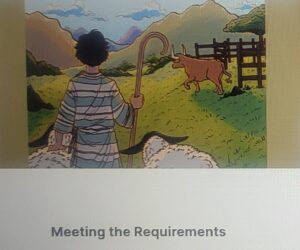
Matthew 5:17-20; Romans 8:3-4; Galatians 3:19-29
This was the first time Joshah had been faced with bringing the offering for his own sins.
God told Moses how He wanted His people to live, and Moses recorded God’s commandments. These laws taught the Children of Israel what God demanded of man. Even though a person could not please God on his own, God had provided a way by which a person could worship Him acceptably. A sacrifice of animals, combined with faith, could atone for sin. This sacrifice pointed ahead to the time when Jesus would die as the perfect Sacrifice and make atonement for the sins of all mankind. Let’s look back over three thousand years into history and see how someone such as Joshah would have made atonement for his sin.
Joshah nervously shifted the strap on his basket from one hand to the other as he walked along the dusty path. Inside the basket, two pigeons cooed and flapped their wings in agitation. He was almost to the Temple. In his mind he rehearsed the ritual words he would say. I have sinned against the commandments of the Most High God. Wilt thou, as the anointed one of His priesthood, make a sin offering in my name that my fault may be purged?
Joshah swallowed, the taste of dust burning in his throat. Though he had seen many others stop at the Temple, he had never been there before. Only a fortnight ago he had come of age, and was now considered a man among his people. As a child, his sins had been atoned for by his parents. Now, the full weight of his misdeeds and the responsibility to make atonement rested upon him.
Hesitating for a moment at the edge of the narrow courtyard which bounded the Temple, he thought once again of the decision, which required this trip to the priest. Three days ago, he had been driving his father’s flock of sheep toward their grazing place. On the way, he had noticed that the ox which belonged to their neighbor, Gehaziel, was straying. Gehaziel was an unjust man, and from his youth Joshah had never thought kindly of him. He knew full well that the Law required him to return the ox to its master, yet he had driven his flock on without pausing.
What a weight of guilt had immediately descended upon him! He had sinned! And he could no longer look to his parents to make atonement for him. The guilt was his, and his alone.
For the first time in all his thirteen years, Joshah had felt unclean, sinful.
That night, Joshah had been unable to eat. Even the hot bread, fresh from the stone oven, did nothing to tempt his appetite.
Later that night, as he had lain on his mat, he had found he could think of nothing but the sin he had committed. He had tossed and turned so restlessly that at last his elder brother Jamlech had told him to either lie still or go out and sleep under the trees. Knowing that any further sign of his turmoil would draw the attention of his parents or brothers, he had forced himself to remain motionless, but sleep had not come.
The next two days had been miserable. Consumed with the thought of his own unrighteousness, Joshah had found it impossible to concentrate on anything else. Finally he could bear the burden no longer. Last night he had sought out his father just after the evening meal.
“Father, I have sinned,” he had confessed in a low voice, unable to raise his eyes to his father’s face. At his father’s gentle questioning, the whole story had come out.
“You know, my son, that as you are now of age it is your responsibility to go before the priest and ask him to make atonement for your sin.” At Joshah’s silent nod he continued. “Attend well to my words, Son. The Lord God has made provision for forgiveness of sins, but you must obey the commandments concerning sacrifice that your offering may be acceptable in His sight.” With sorrow on his face, Amaziah had carefully explained each of the steps that Joshah must take. When he finished, he had placed an arm about his young son’s shoulders.
“I can see, my son, that tomorrow you will go to Gershon, the priest, with a proper spirit of grief for your sin. May God go with you and show respect unto your sacrifice.”
Now the moment had come. Before his courage could fail, Joshah moved quickly forward through the courtyard and stood at the entrance to the Temple. “Is my lord the priest within?” he called.
Almost immediately, Gershon himself stood before him. “I have sinned,” Joshah began. The words he had so carefully learned from his father came from his lips, and then the confession of his misdeed. Joshah’s heart reached out for forgiveness and relief from this burden of guilt. “Will my lord the priest accept these two pigeons and make a sacrifice unto the Lord God in my name?”
The priest took the two pigeons from the basket that Joshah held out, and examined them carefully to be sure they were without blemish. “Yes, God will accept these birds as your offering,” Gershon said at last. “Place your hands upon the heads of these birds, and as you do, let the burden of your guilt be placed upon them.”
As Joshah placed his hands upon the heads of the birds, a strange feeling of ease came into his heart. He had done what he could—he had brought his offering to the priest in faith. Now Gershon would fulfill his obligation before the Lord, and in the sacrificing of the pigeons Joshah would find atonement for his sin.
